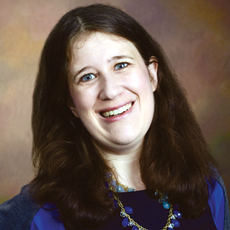
It’s rare that I can directly empathize with the medical concerns of skilled nursing residents. As a reasonably healthy middle-aged person, I’m fortunate that I’m at least a few years away from worrying about issues such as cognitive challenges, a broken hip or macular degeneration.
But let me tell you: When I fell badly on pavement on Tuesday, I gained new empathy for your residents.
I was walking across an intersection in my neighborhood with my husband and toddler, who was luckily in his stroller, when I tripped on construction debris. Later, I looked at the uneven surface, complete with a pothole and thought, “It’s amazing that more people haven’t fallen.”
I screamed loudly enough that my elderly neighbor and her Pomeranian came trotting over to help, then waited with Morty and me while my husband went to get the car. The neighbor is Hope, because of course that’s her name.
I’m badly scraped up, with a left ankle that swelled to levels I have never seen before. But since I knew the ankle wasn’t broken, I’ve been doing RICE (Rest, Ice, Compression and Elevation) and hobbling around the office like I’m Verbal Kint.
As a side note, when I asked our alderman’s office Tuesday about the construction and if it could be cleaned up, they said they’d already heard about it — from Hope. She also texted me to make sure I was OK and had prayers said for me at church service, which renews one’s faith in neighbors and community.
Physically, I’m now much better. The biggest bruise was to my ego. But it’s also been interesting to reflect on how cautious I am as I hobble around, and how vulnerable I felt after I fell. It reminded me of being pregnant in an icy Chicago winter, where I consciously attempted to walk like a penguin. All of that has helped me realize how terrifying it is for elderly residents to fall. We spend so much time thinking about grab bars, mobility aids and types of carpet that we forget about the psychological issues around falling.
One study found that one in 20 seniors worried that no one would notice if they fell. Almost a fourth of older people said poor street conditions, such as poor pavement, made them feel less confident about leaving their home. Fear of falling also correlates to age. While only 21% of seniors between ages 75 and 79 were worried about falling, that increased to 35% for those over age 85.
“One challenge that is not often talked about is their fear of falling again, which can lead to them not wanting to walk or being afraid to walk,” Amy Stewart, MSN, RN, the Vice President of Curriculum Development, American Association of Post-Acute Care Nursing (AAPACN), told me. Of course, this also means the seniors become less mobile. Long-term, they are at risk for constipation, pressure ulcers and isolation.
No one wants to encourage a resident to throw caution to the wind. But I’d like to make a gentle suggestion about once someone has fallen and his or her medical issues have been addressed. Allow, or even prod, the senior to talk about his or her fears of falling.
If they can articulate where they feel the most insecure — transitioning into bed or in the shower — the care plan can make a note of it. But, above all, we want to stress to them that we all have to keep moving forward.
Follow Deputy Editor Elizabeth Newman @TigerELN.




